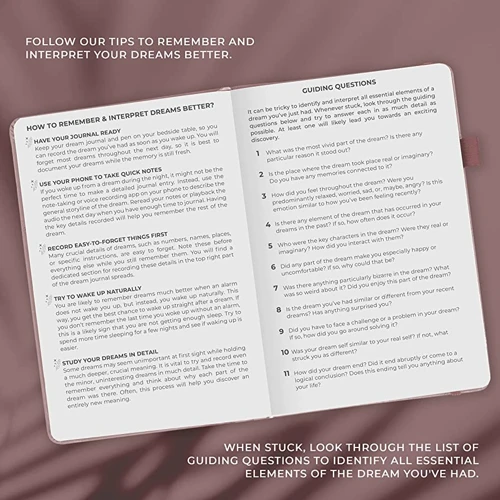Dreams have always been a source of mystery and fascination for humanity. From prophetic visions to subconscious musings, dreams have fascinated people for centuries. However, dreams are not always easy to understand or even remember. That’s where the practice of dream interpretation and dream journaling comes in. By unlocking the secrets of the symbols and events that occur in our dreams, we can gain insight into our innermost thoughts and desires, and even improve our waking lives. In this article, we will explore the art of dream interpretation, the importance of dream recall, and how to improve both with the practice of journaling your dreams.
What is Dream Interpretation?

Dream interpretation is a mysterious and intriguing topic that has captured the attention and curiosity of people for centuries. Dreams are an enigma, often containing vivid images, emotions, and symbols that leave us with more questions than answers. Many people believe that dreams have a deeper meaning that can offer valuable insights into our waking life experiences. However, the challenge lies in understanding the hidden messages that our dreams are trying to convey. In this section, we will explore the concept of dream interpretation and provide insights into how to interpret the symbols and meanings behind your dreams.
Understanding Dream Symbols
Dreams are full of symbols that can help us understand our subconscious mind. Each dream symbol can have various interpretations, so it is important to consider the context and personal associations when analyzing them.
To better understand dream symbols, here are some examples and possible interpretations:
| Symbol | Possible Interpretations |
|---|---|
| Water | represents emotions, the unconscious mind, purification, or fluidity in life |
| Animals | represent instincts, aspects of oneself, or relationships with people |
| Flying | represents freedom, success, or a desire for elevation in life |
| Cars | represent the journey of life, control, or direction in life |
| Death | represents change, transition, or the end of something |
It is important to note that dream symbols can have both positive and negative meanings depending on the specific dream and the individual’s personal associations. For example, while some people may view water as calming and refreshing, others may see it as a symbol of danger and fear.
By paying attention to the different symbols in our dreams and reflecting on their possible interpretations, we can gain a deeper understanding of our subconscious mind and inner thoughts.
Types of Dreams
There are several types of dreams that you may experience in your sleep. Here are some examples:
- Nightmares: These are disturbing or unpleasant dreams that can cause strong feelings of fear, terror or anxiety. Nightmares can often be a result of traumatic experiences or highly stressful situations.
- Lucid Dreams: This type of dream occurs when you are aware that you are dreaming while you are still asleep. In a lucid dream, you can control what happens and may even be able to manipulate the dream environment.
- Recurring Dreams: These dreams are repetitive and can occur several times throughout your life. Recurring dreams often include the same people, objects or settings.
- Prophetic Dreams: Some people believe that these types of dreams can predict future events or provide insights into your subconscious mind.
- False Awakening Dreams: This is a dream in which you believe you have woken up, but in reality, you are still asleep and dreaming.
- Sleepwalking Dreams: This occurs when someone physically walks or performs activities while still asleep. Sleepwalking dreams are often not remembered when the person wakes up.
Understanding the different types of dreams that you may experience can be helpful when interpreting the meaning behind your dreams. Journaling your dreams can assist in identifying recurring themes or patterns in your dreams, which may be a key to unlocking their hidden messages.
What is Dream Recall?

Dream recall refers to the ability to remember dreams upon waking up. It is an essential skill for interpreting and analyzing dreams. Dream recall is the first step towards unlocking the mysteries of your subconscious mind. However, not everyone can remember their dreams upon waking up. Some people may not recall any dreams, while others may only remember vague fragments. This is where journaling can come in handy.
Improving Dream Recall
There are several techniques for improving dream recall. The first step is to set an intention before going to bed. This can be done by repeating a phrase such as, “I will remember my dreams when I wake up.” This helps to prime the mind to focus on dreams during sleep.
Another way to improve dream recall is by avoiding stimulants and alcohol before sleeping. These substances can interfere with the ability to remember dreams. It is also helpful to establish a consistent sleep schedule, allowing for sufficient time to sleep and dream.
The Importance of Dream Recall
Dreams offer insights into our unconscious mind, revealing hidden desires, fears, and emotions. Remembering dreams can help us understand ourselves better, gain clarity about our waking life, and make positive changes. When we pay attention to our dreams, we can uncover recurring patterns and themes, providing clues to unresolved issues in our lives.
Dream recall is crucial for unlocking the deeper meaning of dreams. Journaling can be an effective tool for enhancing dream recall and improving our understanding of the subconscious mind. By setting an intention before bed, avoiding stimulants, and establishing a consistent sleep schedule, we can improve our ability to remember and interpret our dreams. The benefits of dream recall are many, and with practice, anyone can become proficient at remembering and analyzing their dreams.
Why Should You Journal Your Dreams?

Keeping a dream journal is an essential tool for unlocking the mysteries of your subconscious mind. Dreams are often a reflection of our innermost thoughts, feelings and desires, and dream journaling allows us to explore these hidden aspects of ourselves. A dream journal helps us to tap into the power of our dreams, to improve our dream recall, and to gain insight into our waking life.
Perhaps one of the main reasons for dream journaling is that it helps us to remember our dreams more vividly. By writing down our dreams, we make them real, solidifying them in our minds and making it more likely that we will remember them. This is particularly important because dreams can be fleeting – they can disappear from our minds as soon as we wake up. By jotting down our dreams in our journal, we can revisit them later and explore their meanings in more depth.
Dream journaling also provides a way to track our dream patterns over time. As we record more and more dreams, we can begin to see common themes, characters, and symbols that may recur. This can provide valuable insights into our subconscious mind, and help us to understand what is really going on under the surface of our waking life.
Another benefit of dream journaling is that it helps us to interpret our dreams more effectively. Without a written record of our dreams, it can be challenging to remember all of the details, and we may overlook important symbols, emotions or connections. By writing down our dreams in a journal, we can more easily spot patterns, recognize our emotions, and identify connections between our dreams and our waking life.
Finally, dream journaling is a creative and reflective process that can, in itself, be therapeutic. The act of writing down our dreams often leads to a deeper understanding of ourselves and our subconscious mind. It can be a way to express our innermost thoughts, fears and desires, and to gain insights into our lives that we would not have otherwise. By keeping a dream journal, we can develop a greater sense of self-awareness and a deeper appreciation for the rich and complex world of our dreams.
How to Start Journaling Your Dreams

If you’re new to journaling your dreams, getting started can sometimes feel overwhelming. However, with a few simple steps, you can easily begin this powerful practice of self-discovery. In this section, we’ll guide you through the process of starting a dream journal and offer tips for improving your dream recall. By implementing these strategies, you’ll be well on your way to unlocking the hidden wisdom and insights that your dreams have to offer.
Create a Dream Journal
One essential aspect of journaling your dreams is to create a Dream Journal. This special type of journal will serve as a dedicated space for recording your dreams and insights.
To create your Dream Journal, follow these simple steps:
| Step | Description |
|---|---|
| 1 | Choose a notebook: Select a notebook that you will use exclusively for recording your dreams. Choose a size and style that you find appealing and that will be easy to keep by your bed. |
| 2 | Create a title page: Start your journal with a title page that captures the essence of your dream practice. You could include a quote or image that inspires you, or simply write “Dream Journal” in bold letters. |
| 3 | Number the pages: To make it easier to find and reference specific dreams, number the pages of your journal. This will also make it easier to track your progress over time. |
| 4 | Include a table of contents: As you record more dreams, it may become challenging to find specific entries. To make this easier, create a table of contents at the beginning of your journal, so you can quickly find what you’re looking for. |
| 5 | Personalize your journal: make your dream journal uniquely yours. You could decorate the cover, add stickers, or include your favorite quotes or images throughout the journal. This will make your journal a more special and inspiring place to record your dreams. |
By creating a Dream Journal and following these simple steps, you will have a dedicated space to record your dreams and insights. This will make it easier to stay organized, track your progress, and gain deeper insights into the mysteries of your dream life.
Write Down Your Dreams First Thing in the Morning
One of the most important steps in successfully journaling your dreams is to write them down first thing in the morning. This is because our memories of dreams fade quickly upon waking. Here are some tips on how to make this a habit:
- Keep a journal and pen by your bed: This will make it easy to grab and write down your dream without having to get out of bed, which can disrupt your recall.
- Wake up naturally: Whenever possible, allow yourself to wake up without an alarm clock, as this can be jarring and make it harder to remember your dream.
- Don’t move too quickly: A sudden change in position or immediate engagement with a task can cause you to forget details from your dream.
- Start writing as soon as possible: Even if you can only remember a fragment of your dream, write it down right away. Successive details may come flooding back to you as you start to write.
- Record everything: Don’t leave anything out, even if it seems insignificant. This can help you recognize patterns and connections later on.
- Write in the present tense: This can help make your dream feel more immediate and vivid.
By making a habit of writing down your dreams first thing in the morning and following these tips, you can greatly improve your dream recall and increase your ability to interpret your dreams through journaling.
Use Dream Keywords
One effective technique for journaling your dreams is to use dream keywords. Rather than trying to write down every detail of your dream, focusing on keywords can help you capture the essence of the dream and its symbols in a concise way. This method can make it easier to interpret your dreams later on.
To use dream keywords, start by scanning through your dream journal and identifying words or phrases that stand out to you. These could be objects, emotions, actions, or anything else that feels significant. Write these keywords down in a separate list or next to the entry for that particular dream.
Here’s an example of how you might use dream keywords to record a dream:
Dream entry:
“I was wandering through a maze-like garden, trying to find my way out. There were hedges and flowers everywhere, and the sun was shining down on me. Suddenly, I heard a loud buzzing sound and saw a swarm of bees coming towards me.”
Keywords:
– Maze
– Garden
– Sun
– Bees
By highlighting these keywords, you can more easily pick out patterns or connections between different dreams. For example, if you notice that you often dream about mazes, this could be a symbol for feeling lost or confused in your waking life. Or if you frequently dream about bees, you might want to explore the symbolism of bees in different cultures or literature.
Using dream keywords can be a powerful tool for unlocking the mysteries of your dreams and improving your dream recall.
How to Interpret Your Dreams Through Journaling

Dreams can be mysterious and confusing, leaving us wondering about their meaning and significance. However, interpreting our dreams can provide valuable insights into our subconscious thoughts, emotions, and desires. Journaling our dreams is an effective way to unlock their mysteries and understand their messages. By examining our dreams through a journal, we can begin to recognize patterns, identify emotions, and explore different perspectives related to our waking life. With a bit of guidance and practice, anyone can learn how to interpret their dreams through journaling. Let’s delve into the various techniques and approaches for interpreting our dreams through journaling.
Recognize Patterns
One helpful way to interpret your dreams through journaling is to recognize patterns. This involves looking for recurring themes, symbols, or images in your dreams. By identifying these patterns, you can gain insight into your subconscious thoughts and emotions.
To recognize patterns in your dreams, create a table to record common themes and symbols. In one column, list the symbols or themes that you have noticed in your dreams. In another column, jot down any significant events or emotions associated with each symbol or theme. Here is an example of what the table might look like:
| Symbol/Theme | Significant Events/Emotions |
|---|---|
| Water | Feeling overwhelmed, drowning, swimming |
| Animals | Feeling threatened, protection, companionship |
| Death | Sadness, fear, acceptance |
By recording these patterns, you may begin to see connections between your dreams and your waking life. For example, if you notice that you frequently dream about water when you are going through a stressful time at work, the water symbol may represent your feelings of overwhelm and stress. Recognizing this pattern can help you address these emotions in your waking life.
Recognizing patterns in your dreams through journaling can be a powerful tool for gaining insight into your subconscious mind and improving your emotional well-being. So start keeping a dream journal today and see what patterns emerge!
Identify Emotions
When interpreting dreams, it’s important to pay attention to the emotions you experienced in your dream. Your emotions can provide valuable insight into the meaning of your dream. Here are some steps you can take to identify the emotions in your dreams:
| Step | Action |
|---|---|
| 1 | Read through your dream journal entry and make note of any emotions that come to mind. |
| 2 | Use a thesaurus to find synonyms for any emotions you’ve identified. This can help you to see the emotion from different perspectives. |
| 3 | Consider the intensity of the emotions you felt in your dream. Did you feel a mild sense of unease or an overwhelming sense of terror? |
| 4 | Think about any specific events or symbols in your dream that may have triggered certain emotions. |
| 5 | Compare the emotions you experienced in your dream to your waking life. Are there any similarities or connections? |
By identifying the emotions in your dreams, you can gain a better understanding of your subconscious thoughts and feelings. This can help you make positive changes in your waking life and improve your overall well-being.
Look for Connections to Your Waking Life
One of the most interesting aspects of dream interpretation is discovering how our dreams relate to our day-to-day lives. When journaling your dreams, take note of any elements in the dream that may connect to events or emotions in your waking life.
Here are some ways to look for connections to your waking life in your dreams:
- People: Do any familiar faces appear in your dream? Are they people from your past or present? Do they remind you of anyone else in your life?
- Emotions: How did you feel during the dream? Did you experience any intense emotions like fear, joy, or anger? Can you connect those emotions to anything happening in your life?
- Activities: Did you do anything in the dream that relates to your daily routine or hobbies? Did you participate in an activity that you have been wanting to try?
- Objects: Take note of any objects that appear in your dreams. Do they hold any significance to you?
- Symbols: Dreams are notorious for using symbols to represent deeper meanings. Pay attention to any symbols that appear and try to connect them to events or emotions in your waking life.
By identifying connections between your dreams and your waking life, you may be able to gain a better understanding of your subconscious mind and the challenges you may be facing in your daily life.
Explore Different Perspectives
One effective way to interpret your dreams through journaling is to explore different perspectives. When analyzing your dreams, it can be helpful to consider how different aspects of the dream may represent different parts of yourself or your life.
Here are some ways to explore different perspectives:
- Consider the Point of View: Take note of who you are in the dream and whether you are observing the events in the dream or actively participating. This can give insight into your current role in your waking life and your relationship to the events unfolding.
- Look for Duality: Dreams often feature opposing forces or dualities, such as light and dark, good and evil, or love and hate. Explore how these elements may be reflected in your waking life, and consider how you can bring balance to these opposing forces.
- Focus on the Details: Pay attention to specific objects or details in the dream that may hold symbolic meaning. For example, if you dream of a bird flying freely in the sky, it may represent a desire for freedom or independence.
- Explore the Emotions: Think about how you felt during the dream and how those emotions may relate to your waking life. Emotions in dreams often represent repressed or unacknowledged feelings in waking life.
- Consider Others: Dreams can also feature other people, such as friends, family members, or strangers. Explore what those people may represent to you or what qualities they possess that you may be lacking or desiring.
Exploring different perspectives can help you gain a deeper understanding of the messages your dreams are trying to convey. It can also bring greater awareness to your inner thoughts and emotions, leading to personal growth and self-discovery.
Other Tips for Improving Dream Recall

If you’re having trouble remembering your dreams, don’t worry—you’re not alone. Many people struggle to recall their dreams, but there are several simple tips and tricks you can try to improve your dream recall. By incorporating these strategies into your daily routine, you may find that you start to remember more of your dreams and gain a deeper insight into your subconscious mind. Here are some suggestions for improving your dream recall:
Set Your Intention Before Bed
One helpful tip for improving dream recall is to set your intention before bed. This means that you should make a conscious decision to remember your dreams and focus on this goal before you go to sleep. This can be done through visualization, affirmations, or simply repeating to yourself that you will remember your dreams.
To set your intention before bed, try the following steps:
| Step 1: | Find a quiet, comfortable place to sit or lie down. |
| Step 2: | Close your eyes and take a few deep breaths to relax. |
| Step 3: | Visualize yourself waking up in the morning and immediately remembering a dream. |
| Step 4: | Repeat affirmations to yourself, such as “I will remember my dreams” or “My dream recall is improving.” |
| Step 5: | Focus your attention on your desire to remember your dreams, and then drift off to sleep. |
By setting your intention to remember your dreams, you are more likely to wake up with a sense of focus and purpose, which can help you recall more details from your dreams. This technique can be particularly useful if you tend to have trouble remembering your dreams or if you want to improve the clarity of your dream recall.
Avoid Stimulants and Alcohol before Sleeping
A crucial factor in improving dream recall is to avoid consuming stimulants and alcohol before sleeping. These substances can interfere with the sleep cycle, making it harder to achieve deep sleep and reducing the likelihood of dreaming.
Stimulants such as caffeine are well-known to keep people awake and alert, but they can also affect the quality of sleep. Drinking coffee, tea, or energy drinks too close to bedtime can result in restlessness and difficulty falling asleep, which can ultimately lead to a poor dream experience. Similarly, smoking cigarettes or using nicotine products before sleeping can also disrupt sleep patterns and impede dream recall.
Alcohol is another substance to avoid before sleeping, as it can interfere with the natural sleep cycle by reducing the amount of time spent in restorative deep sleep. It can also affect the body’s ability to regulate temperature during the night, leading to more frequent awakenings and a greater chance of forgetting dreams.
To enhance dream recall and improve the overall quality of dreaming, it is recommended to avoid consuming stimulants and alcohol in the hours leading up to sleep. Instead, opt for calming activities such as meditation, reading, or listening to relaxing music, which can help promote a restful sleep and a productive dream experience.
The Benefits of Journaling Your Dreams
Dream journaling can provide numerous benefits that can impact your mental, emotional, and even physical health. One of the primary benefits of keeping a dream journal is that it can improve your dream recall. As you consistently record your dreams, you become more aware of them, and your mind becomes better accustomed to remembering them. This can lead to more vivid and frequent dreams, which can provide valuable insights into your subconscious mind.
Another benefit of journaling your dreams is that it can help you to identify recurring patterns, themes, and symbols. By analyzing these patterns, you can gain a better understanding of the areas of your life that may need attention or reflection. Additionally, keeping a dream journal allows you to explore your own emotions and thought processes, which can lead to personal growth and self-discovery.
Dream journaling can also provide a sense of creative inspiration. Dreams are often filled with vivid imagery, unusual scenarios, and imaginative concepts. By recording these elements in a dream journal, you can revisit them later and potentially use them as inspiration for creative projects such as writing, art, or music.
Additionally, dream journaling can have therapeutic benefits. For those struggling with mental health issues such as anxiety or depression, the insights gained from dream interpretation can provide a unique perspective and lead to potential breakthroughs in treatment. Dream journaling can act as a form of stress relief or relaxation, allowing individuals to process any difficult emotions they may be experiencing.
Dream journaling is a powerful tool for self-reflection, personal growth, and creativity. By taking the time to record and analyze your dreams, you can gain valuable insights into your subconscious mind and potentially unlock the mysteries of your inner self.
Conclusion
In conclusion, dream journaling is a powerful tool that can help unlock the mysteries of your subconscious mind. Through recording and interpreting your dreams, you can gain valuable insight into your innermost thoughts, desires, fears, and beliefs. By recognizing patterns, identifying emotions, exploring different perspectives, and making connections to your waking life, you can begin to understand the hidden messages and symbolism within your dreams.
Furthermore, journaling your dreams can help improve your dream recall over time, making it easier to remember and analyze your dreams. By setting your intention before bed and avoiding stimulants and alcohol before sleeping, you can also create a conducive environment for dreaming and increase your chances of having meaningful dreams.
The benefits of dream journaling are numerous, including enhancing self-awareness, promoting personal growth, reducing stress and anxiety, and boosting creativity. Whether you are a seasoned dream interpreter or a beginner just starting out, keeping a dream journal can be a valuable addition to your self-care routine.
So, grab a notebook and pen, and start recording your dreams today. Who knows what secrets and insights you will uncover? Happy dreaming!
Frequently Asked Questions
What if I don’t remember my dreams?
Don’t worry, this is common. Try setting an intention before bed to remember your dreams and keep a journal nearby to jot down any fragments or emotions that you can recall upon waking.
Can dream journaling help with lucid dreaming?
Yes, keeping a dream journal can increase self-awareness and the ability to recognize when you are dreaming, which can make it easier to achieve lucidity in dreams.
Do different symbols have the same meaning for everyone?
No, dream symbols can have varied meanings for different individuals based on personal experiences and associations.
Can interpreting dreams help with therapy?
Yes, dream interpretation can provide insight into the subconscious mind and help therapists identify underlying issues or emotions that need to be addressed.
Can nightmares be helpful to interpret?
Yes, nightmares can reveal suppressed fears or traumas that need to be addressed in waking life. It can also provide an opportunity for catharsis and personal growth.
Is it important to write down dreams immediately after waking up?
Yes, it is best to write down your dreams as soon as possible after waking up to ensure accuracy and prevent forgetting important details.
Can external factors affect dream recall?
Yes, external factors such as stress, medication, and sleep disturbances can affect dream recall. It is important to prioritize a healthy sleep routine to maximize dream recall.
Can meditation improve dream recall?
Yes, meditation can increase self-awareness and can also improve overall sleep quality, leading to clearer and more vivid dreams.
Is it possible to control the content of my dreams?
No, we cannot control the content of our dreams. However, we can influence them through intention-setting and visualization techniques before falling asleep.
Can recurring dreams have a deeper meaning?
Yes, recurring dreams can indicate unresolved issues or emotions that need to be addressed. Identifying patterns and themes in recurring dreams can provide valuable insight into the subconscious mind.








